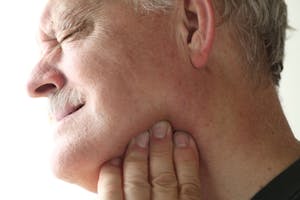
Temporomandibular disorder (TMD), is a term that describes an entire group of disorders involving the temporomandibular joint or joints (TMJ).
The TMJs are your jaw joints. There is one on each side of your head just in front of your ear canals. Like many other joints in the body, they consist of:
- Muscles that control joint movement,
- Ligaments that hold the bones together,
- Cartilage that provides a smooth surface for the bones to move on,
- A disc that helps with proper movement, of the bones,
- Elastic tissue that helps hold the disc in place.
One or more of the above tissues can cause symptoms. The muscles (myogenous), joint(s) (arthrogenous), or a combination of the two may cause pain. Studies suggest that one third of the population at any one time experiences TMJ symptoms such as pain with chewing, yawning, or jaw opening. Women seem to have TMJ problems much more often than men.
Since physical therapists treat muscle and joint problems, they are ideally suited to address a TMD. Moreover, a majority of patients diagnosed with TMD, also have associated neck pain. Both respond well to treatment provided by a physical therapist. No other healthcare practitioner is better suited to address both the TMD and neck pain.
Our physical therapists treat TMJ disorders using manual interventions, modalities and neuromuscular re-education. We are able to assess the muscular involvement typically related to stress, clenching or grinding of the teeth, poor joint mechanics of the jaw and upper cervical spine, as well as, postural imbalances often associated with this diagnosis.
Through the combined techniques of:
- Manual treatments, including joint mobilization & massage,
- Exercises for postural strengthening and stretching, and
- Re-education of the jaw joint mechanics (opening and closing) and tongue positioning
...we have had great success with treating this disorder.
